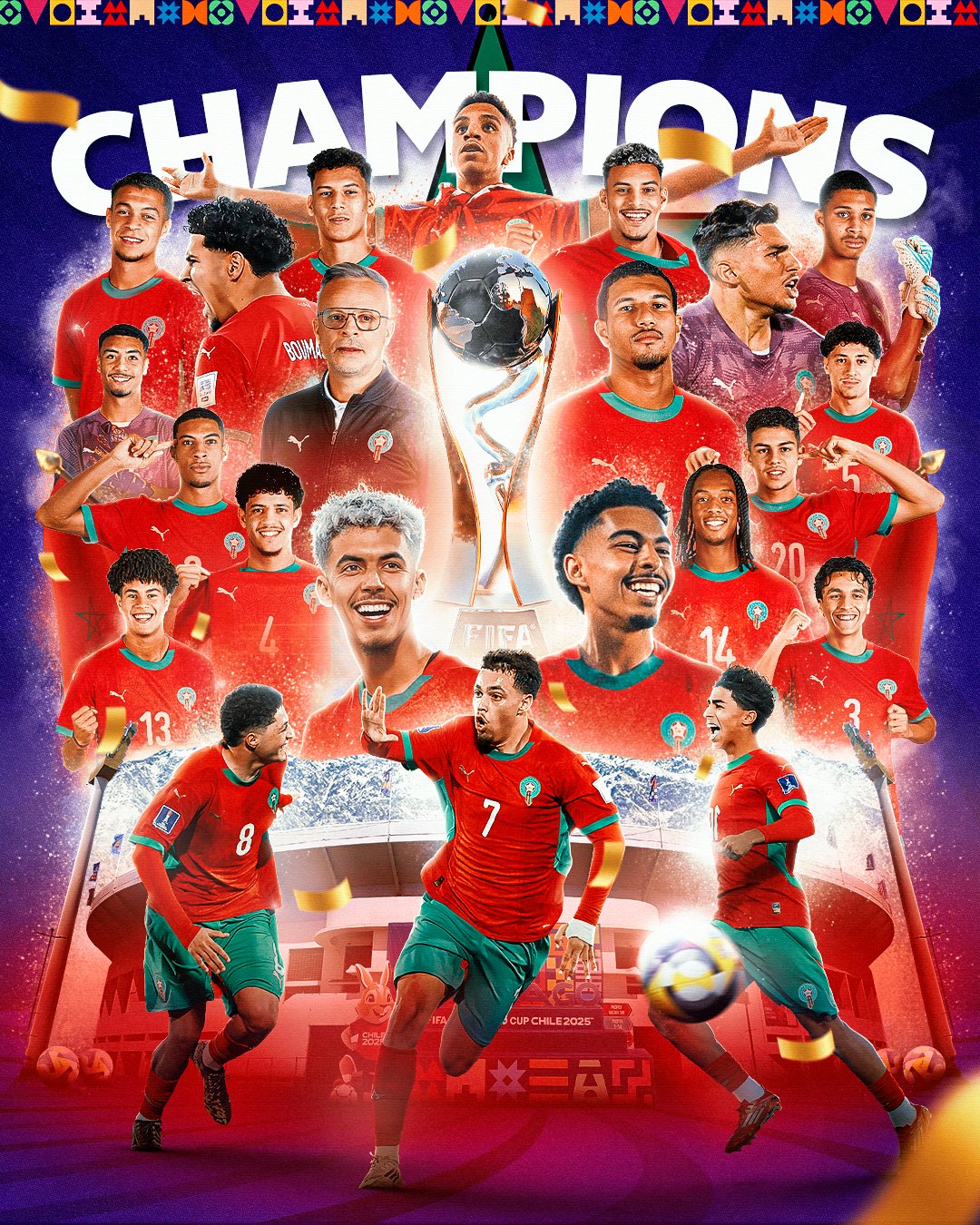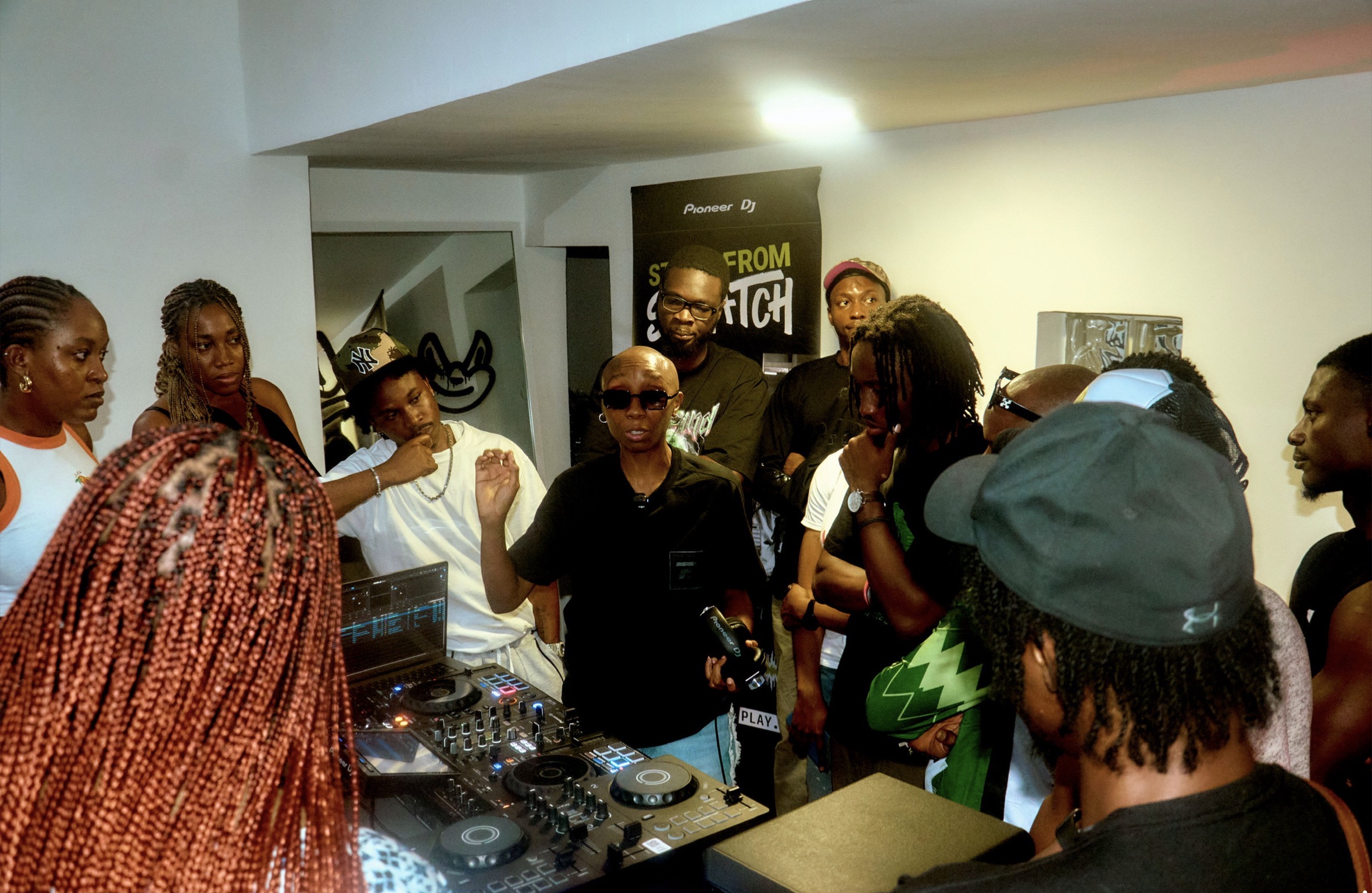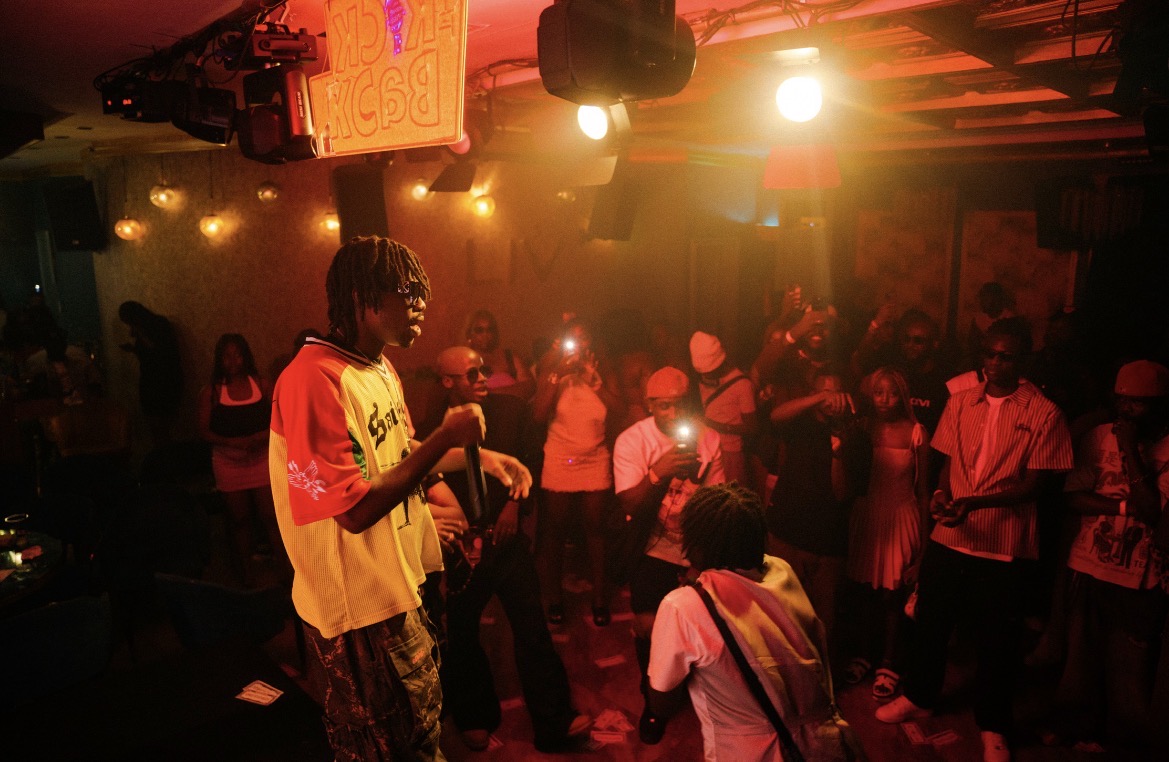In a moment that will be remembered as one of the most significant milestones in African football history, Morocco’s Under-20 national team triumphed 2–0 over six-time champions Argentina to win the 2025 FIFA U-20 World Cup in Santiago, Chile. This victory not only handed Morocco their first-ever global football title but also made them only the second African nation, after Ghana in 2009, to lift the coveted trophy.
World Champions! 🏆🇲🇦#U20WC pic.twitter.com/oG1N7WsTJM
— FIFA World Cup (@FIFAWorldCup) October 20, 2025
A Historic Night in Santiago
The final took place on October 19, 2025, at the iconic Estadio Nacional Julio Martínez Prádanos in Santiago. The stadium, packed with nearly 50,000 spectators, witnessed a performance of maturity, discipline, and brilliance from a Moroccan side that has consistently defied expectations throughout the tournament.
From the first whistle, Morocco showed no signs of intimidation despite facing the record-holding Argentine squad, whose youth teams have historically dominated the U-20 World Cup. The North Africans approached the match with confidence and a tactical setup that blended compact defending with swift counterattacks, a formula that would soon yield results.
Morocco’s first goal came as early as the 12th minute, when Yassir Zabiri, the team’s creative midfield engine, delivered a breathtaking free kick that curled into the top corner past Argentina’s helpless goalkeeper. The goal sent Moroccan fans into delirium, setting the tone for what would become a night of glory.
Seventeen minutes later, Zabiri struck again, this time finishing off a fast counterattack orchestrated by winger Othmane Maamma, who broke down the right flank and squared an inch-perfect pass into the box. Zabiri’s calm finish doubled Morocco’s lead, and from that moment, the Atlas Cubs never looked back.
Argentina’s Struggle and Morocco’s Defensive Brilliance
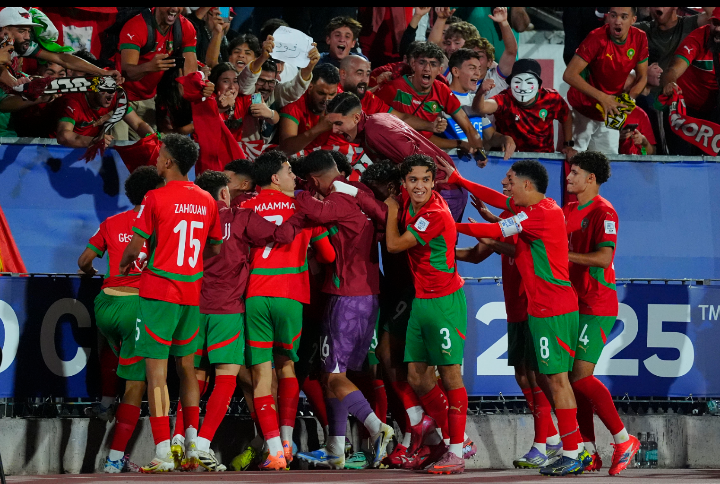
Argentina, chasing their seventh U-20 World Cup title, tried to respond with waves of attacks led by their star forward Santiago Castro. However, Morocco’s defence, marshalled by Captain Abdelmalek El Hamdani, stood impenetrable. The defensive line, supported by goalkeeper Ayoub Aït Lhaj, maintained remarkable composure under pressure, denying Argentina any real chance to find a way back into the game.
By halftime, Argentina had enjoyed more possession, but Morocco’s counter-punching strategy continued to cause problems. In the second half, Argentina made tactical substitutions, pushing higher up the pitch, but the Moroccan team absorbed the pressure intelligently, closing down spaces and maintaining their structure.
In the closing minutes, as Argentina desperately pushed forward, Morocco nearly added a third goal through substitute striker Mohamed Essadik, whose curling shot clipped the post. The final whistle blew shortly after, sealing a 2–0 victory that will echo through African football history.
A Journey of Determination and Unity
Morocco’s road to the title was as inspiring as the final itself. Drawn into what was dubbed the “Group of Death,” alongside Brazil, Spain, and Japan, the young Atlas Lions defied the odds. They started their campaign with a 1–1 draw against Spain before shocking Brazil with a 2–1 victory. A 3–0 win over Japan in their final group match ensured their progression to the knockout rounds as group leaders.
In the Round of 16, Morocco faced South Korea, earning a hard-fought 1–0 victory courtesy of a goal from Maamma. The quarterfinal against the United States proved to be another test of resilience; after a 1–1 draw, Morocco triumphed 4–3 in a dramatic penalty shootout. Their semifinal clash against France was one of the tournament’s most thrilling encounters, a 2–2 draw settled once again by Morocco’s composure in penalties.
By the time they reached the final, Morocco had already captured global attention for their consistency, tactical awareness, and fearless play against traditional football powerhouses. Their unbeaten record throughout the tournament cemented their place as worthy champions.
Continental Pride and a Historic Milestone
This triumph marks a monumental moment for both Morocco and the African continent. The victory makes Morocco the first Arab nation and the second African team to win the U-20 World Cup, following Ghana’s historic 2009 triumph in Egypt.
The Royal Moroccan Football Federation (FRMF) has been widely praised for its investment in youth development, infrastructure, and coaching. Under the leadership of President Fouzi Lekjaa, Morocco has established world-class training facilities and academies that nurture young talent, aligning with the nation’s long-term football vision. The U-20 team’s success is therefore seen as a direct result of years of structured planning and investment.
The FRMF released a statement after the match:
“This victory is for every Moroccan, for Africa, and for all who believe in the power of preparation, teamwork, and national pride. Our young players have made history and inspired future generations.”
Stars of the Tournament
While the entire squad deserves credit, several players stood out for their exceptional performances throughout the tournament.
- Yassir Zabiri: The hero of the final, whose two goals sealed the championship. His vision, technique, and leadership earned him the Man of the Match award.
- Othmane Maamma: The creative midfielder who orchestrated play from deep and provided crucial assists, was named the Golden Ball Winner for being the best player of the tournament.
- Ayoub Aït Lhaj: Morocco’s goalkeeper, who kept four clean sheets in seven matches, including the final, received praise for his command and composure.
- Abdelmalek El Hamdani: The captain led by example, marshalling the defence and inspiring confidence throughout the campaign.
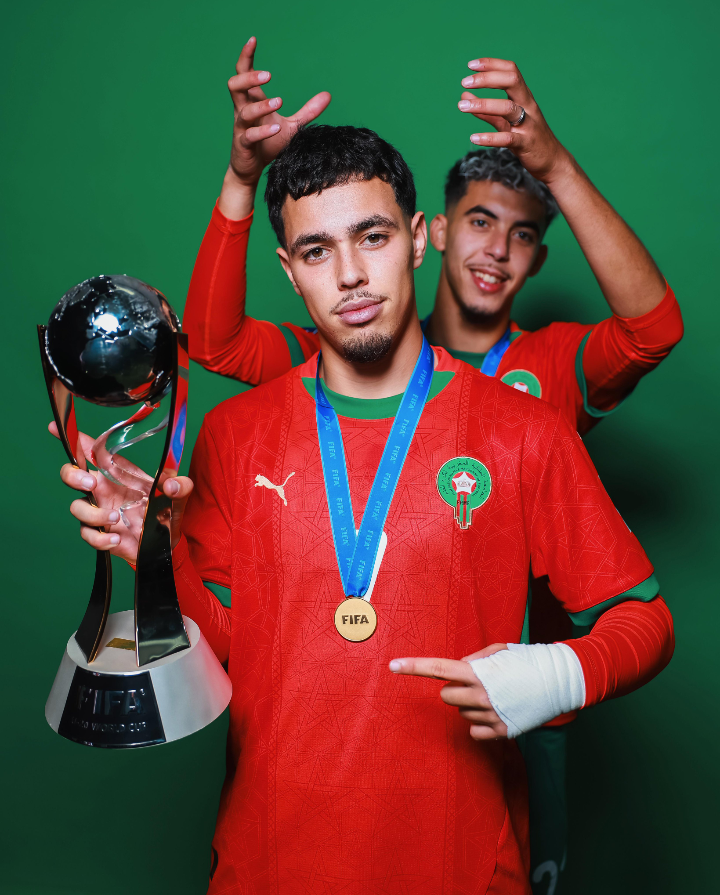
The Symbolism Behind Morocco’s Triumph
Morocco’s victory transcends sport; it represents a broader symbol of African ambition and unity. In recent years, African football has witnessed a renaissance, with Morocco’s senior team reaching the semifinals of the 2022 FIFA World Cup in Qatar, the first ever for an African nation. The U-20 triumph now adds another layer to that legacy, confirming Morocco’s position as one of the continent’s leading football nations.
It also reaffirms the growing competitiveness of African youth teams, many of which have adopted advanced European training methods, analytics, and tactical innovations while maintaining African creativity and flair. For Morocco, this balance has proven decisive.
Reactions Across the Football World
Social media erupted in celebration following the final whistle. Moroccan fans filled the streets of Rabat, Casablanca, and Marrakech, waving flags and singing national songs deep into the night. Across Africa, football enthusiasts hailed Morocco’s victory as a victory for the entire continent.
CAF (Confederation of African Football) President Patrice Motsepe congratulated the team, stating:
“This is not just a win for Morocco but a triumph for Africa. It shows that with investment, structure, and vision, African nations can compete, and win at the highest level.”
Even Argentina’s coach, Javier Mascherano, graciously acknowledged Morocco’s superiority:
“They were disciplined, efficient, and played with heart. They deserve this victory.”
Looking Ahead: The Future of Moroccan Football
With this achievement, Morocco’s football future looks brighter than ever. Many of these young stars are expected to graduate into the senior national team, joining a golden generation that already includes world-class players like Achraf Hakimi, Sofyan Amrabat, and Hakim Ziyech.
The U-20 victory serves as a reminder that Morocco’s football revolution is far from over. From grassroots to elite competition, the country is building a foundation capable of sustained global success.

